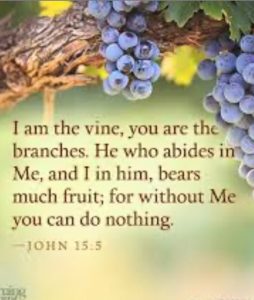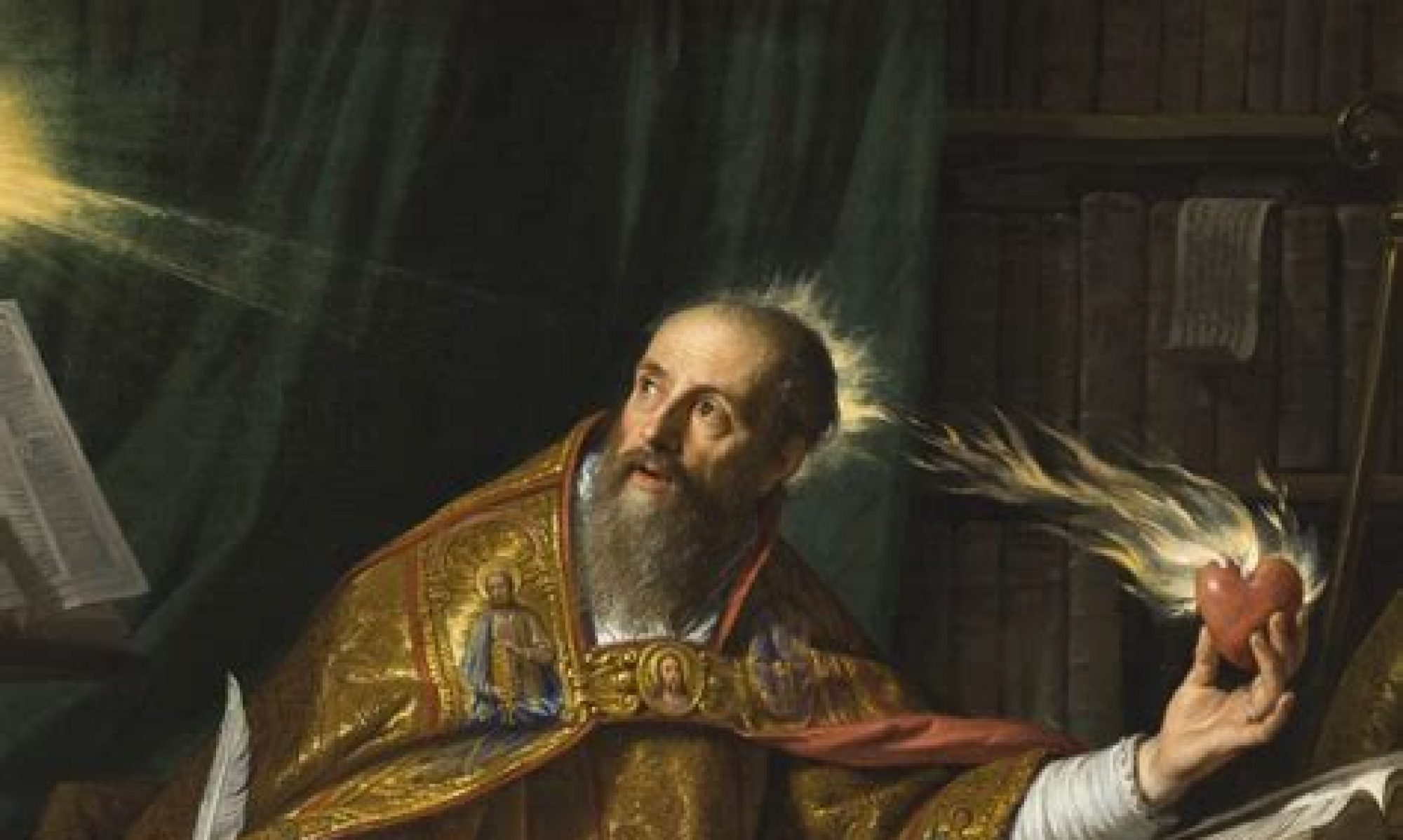We are in the 5th Sunday of Easter. We have good sunny weather to enjoy and to have a good time with outdoor activities. Some of us are busy preparing the garden to plant ornamentals and vegetables. Some plant fruit trees in their backyard. In this way, we connect to the earth as we reflect the value of being connected to God, others and to our surroundings. Jesus says, “Whoever remains in me and I in him will bear much fruit, because without me you can do nothing.” The highlight and the importance of our connection and lifeline to Christ is crucial. If we’re disconnected, we wither and die like a dead branch, and that means we are nothing. The very source of our life in order to bear much fruit is to remain with the main branch, our strength, and to give glory to Him.
In today’s reading, Saul was persecuting the first century Christians without being afraid. He continued to torture and kill those who followed Jesus. The disciples of Jesus were afraid of him. However, by God’s grace of conversion, Jesus appeared to him and that was the beginning of converting to be a staunch follower of Jesus. The name Saul was changed to Paul, and with his courageous assistant, Barnabas, these two new converts shared their faithfulness to proclaim the gospel of the Lord, Jesus Christ. They did their best to work hard for evangelization. Paul, through his actions, had proven that His faith in Jesus was real. Paul was an instrument in spreading the word as he went off from Jerusalem to tell of the consolations of the Holy Spirit and the power of the Resurrection. The believers of Christ were growing in numbers, and their faith became strong.
The second reading, from the first letter of St. John, manifests that believing in Jesus and loving one another are not represented as two separate commandments, but rather as one command. It requires obedience to the fullness of both Christ-believing and people-loving being what it means to abide in Jesus, to have a vital connection to the source of all eternal and true life and joy through the Spirit. The only problem is that we would rather love our way, rather than God’s way.
Today’s gospel is taken from the evangelist John narrating the story of the vine and the vine grower. “I am the vine; you are the branches.” There are many images that we need to consider.
First, Jesus says, “My Father is the vine grower.” In this gospel, the Father is depicted as the vine grower in this story. He is the main architect in making the vineyard more productive in order to achieve the expected harvest. The vine grower spends abundant time and careful checking of everything in the vineyard for a successful end-result. He will do whatever is needed by His constant and nurturing love. In the same way, the Father spends great time and care in watching over each of us.
Second, Jesus says, “I am the vine, you are the branches. Whoever remains in Me and I in him will bear much fruit.” St. John, the evangelist, portrays Jesus as the New Israel who bears much fruit pleasing to the Father by declaring that He is the “true vine.” Jesus’ words have to remain in us, and since we are connected to Him, we are to ask for whatever we desire, and it will be done. It is obvious that the growth of a fruit or a flower depends on being attached to the vine which provides sustenance for their growth. Jesus is the Vine, and we are the branches, and if we are apart from the Vine, we can do nothing. We grow, we mature, we bear fruit which is the result of living His words and His ways. If we are apart from the Vine, we become barren and wither as a result of doing our own will, rather than allowing Jesus and His words to influence us.
Third, Jesus says, “You are the branches….You are already pruned because of the word that I spoke to you. Remain in Me as I remain in you.” The words “branches, prune and remain” are images of conditioned attachment of our hearts and spirits with Jesus, the true Vine. Being the branch is the validating connection with the main vine. However, our natural reaction is that we do not like the thought or experience of being pruned. The idea of “pruning” is suggesting deepening our friendship and love; therefore, there is a need to remain constantly in Jesus. As branches of the true vine, which is Jesus, is part of the love which Jesus offers in order to experience the holiness of our soul and grow in Christian virtues. Then, we are assured of a fruitful life.
Let us pause and ask ourselves, how are the fruits of our labor connected to our relationship with Christ? Are we resisting some pruning that God is trying to do with us? We need to offer ourselves as obedient children of God to pray for each other so that we may be branches bearing fruit of goodness and glorifying God with our actions, particularly as we work towards healing our hurting world, community and family. Jesus is the Vine and we are the branches!
God bless you.
Fr. Arlon, osa
————————-
El Dictado del Corazón
Quinto Domingo de Pascua, Año B
- Hechos 9:26-31
- Salmo 22:26-27, 28, 30, 31-3
- 1 Juan 3:18-24
- Juan 15:1-8
Estamos en el Quinto Domingo de Pascua. Estamos teniendo un buen día soleado para disfrutar y pasar un buen rato con actividades al aire libre. Algunos de nosotros estamos ocupados preparando el jardín para plantar flores para decorar nuestro jardín, hortalizas o árboles frutales. De esta manera, nos conectamos con la tierra mientras reflexionamos sobre el valor de estar conectados con Dios, los demás y nuestro entorno. Jesús dice: “permanece en mí y yo en él, ése da fruto abundante, porque sin mí nada pueden hacer”. Lo más destacado y la importancia de nuestra conexión y salvación con Cristo es crucial. Si estamos desconectados, nos marchitamos y morimos como una rama muerta, y eso significa que no somos nada. La fuente misma de nuestra vida para poder dar mucho fruto es permanecer en el pámpano principal, nuestra fuerza, y dar gloria a Dios.
En la lectura de hoy, Saulo perseguía sin miedo a los cristianos del primer siglo. Continuó torturando y matando a los que seguían a Jesús. Los discípulos de Jesús le tenían miedo. Sin embargo, por la gracia de Dios. Jesús se le apareció y ese fue el comienzo de su conversión para ser un seguidor de Jesús. El nombre de Saulo fue cambiado a Pablo, y con su valiente asistente Bernabé, estos dos nuevos conversos compartieron su fidelidad para proclamar el evangelio de Jesucristo. Hicieron todo lo posible para trabajar duro por la evangelización. Pablo, a través de sus acciones, había demostrado que su fe en Jesús era real. Pablo fue un instrumento para difundir la palabra cuando salió de Jerusalén para hablar de los consuelos del Espíritu Santo y del poder de la Resurrección. Los creyentes en Cristo crecían en número y su fe se fortaleció.
La segunda lectura, de la primera carta de San Juan, manifiesta que creer en Jesús y amarse unos a otros no se presentan como dos mandamientos separados, sino como un solo mandamiento. Requiere obediencia a la plenitud del ser que cree en Cristo y ama a las personas, lo que significa permanecer en Jesús y tener una conexión vital con la fuente de toda vida y gozo eterno y verdadero a través del Espíritu. El único problema es que preferimos amar a nuestra manera que a la manera de Dios.
El evangelio de hoy está tomado del evangelista Juan narrando la historia de la vid y el viñador. “Yo soy la vid; ustedes son las ramas”. Hay muchas imágenes que debemos considerar.
Primero, Jesús dice: “Mi Padre es el viñador”. En este evangelio, el Padre es representado como el viñador de esta historia. Es el principal artífice de hacer más productivo el viñedo para conseguir la cosecha esperada. El viticultor dedica mucho tiempo y controla cuidadosamente todo lo que hay en el viñedo para obtener un resultado exitoso. Él hará todo lo que sea necesario gracias a Su amor constante y nutritivo. De la misma manera, el Padre dedica mucho tiempo y cuidado a velar por cada uno de nosotros.
En segundo lugar, Jesús dice: “Yo soy la vid, ustedes son los pámpanos. El que permanece en Mí y Yo en él, dará mucho fruto”. San Juan, el evangelista, retrata a Jesús como el Nuevo Israel que da mucho fruto agradable al Padre al declarar que Él es la “vid verdadera”. Las palabras de Jesús deben permanecer en nosotros y, dado que estamos conectados con Él, debemos pedir todo lo que deseemos y será hecho. Es obvio que el crecimiento de un fruto o de una flor depende de estar adheridos a la vid que les proporciona sustento para su crecimiento. Jesús es la Vid, y nosotros somos los pámpanos, y si estamos separados de la Vid, nada podemos hacer. Crecemos, maduramos y damos frutos que son el resultado de vivir Sus palabras y Sus caminos. Si estamos separados de la Vid, nos volvemos estériles y nos marchitamos como resultado de hacer nuestra propia voluntad, en lugar de permitir que Jesús y Sus palabras nos influyan.
En tercer lugar, Jesús dice: “Ustes son las ramas… Ya están podados por la palabra que he hablado. Permaneced en Mí como Yo permanezco en vosotros”. Las palabras “sarman, podan y permanecen” son imágenes del apego condicionado de nuestros corazones y espíritus a Jesús, la Vid verdadera. Ser el pámpano es la conexión validadora con la vid principal. Sin embargo, nuestra reacción natural es que no nos gusta la idea o la experiencia de ser podados. La idea de “poda” sugiere profundizar nuestra amistad y amor; por lo tanto, es necesario permanecer constantemente en Jesús. Como sarmientos de la vid verdadera, que es Jesús, es parte del amor que Jesús ofrece para experimentar la santidad de nuestra alma y crecer en las virtudes cristianas. Entonces, tendremos asegurada una vida fructífera.
Hagamos una pausa y preguntémonos: ¿cómo se conectan los frutos de nuestro trabajo con nuestra relación con Cristo? ¿Estamos resistiendo alguna poda que Dios está tratando de hacer con nosotros? Necesitamos ofrecernos como hijos obedientes de Dios para orar unos por otros para que seamos sarmientos que den frutos de bondad y glorifiquen a Dios con nuestras acciones, partid especialmente mientras trabajamos para sanar nuestro mundo, comunidad y familia heridos. ¡Jesús es la Vid y nosotros somos los pámpanos!
Hermanos y hermanas, hay tres cosas que necesito recordarles:
Primero, es verano, quisiera recordarles a todos que debemos respetar al Señor, cada vez que vengan a la Iglesia para la celebración de la misa, por favor, vístanse apropiadamente, sin pantalones cortos, sin ropa indecente. No estamos aquí para el espectáculo sino para adorar a Dios. Por favor respeta la casa de Dios.
En segundo lugar, durante la comunión, extienda los brazos simplemente para expresar su deseo de recibir el cuerpo de Cristo en lugar de que el sacerdote se acerque a usted. Es el Señor quien ofrece Su cuerpo sagrado, pero debemos mostrar nuestra disposición a aceptarlo extendiendo con reverencia nuestros brazos con las manos abiertas o recibiéndolo por la lengua en lugar de ser pasivos.
En tercer lugar, durante la consagración nunca abandones tu asiento hasta que termine la solemne consagración para ir al baño. Asegúrate de arrodillarte y la consagración es la parte más solemne de la misa.
Traten de tener estos importantes puntos siempre en cuenta.
Dios lo bendiga.
P. Arlón, osa

